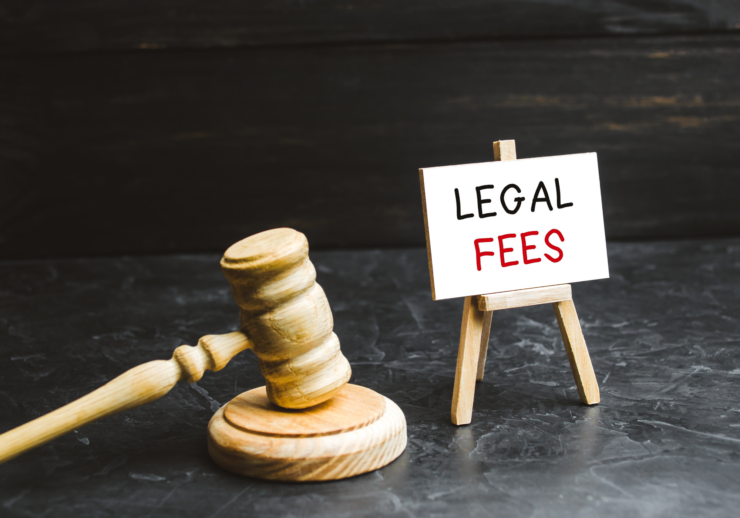Navigating legal fees can be a daunting task for many consumers, but understanding your rights and options can help you avoid unexpected costs. Legal fees can often be disguised by businesses using tactics like “drip pricing,” where additional charges are layered onto the advertised price, making the service more expensive than you initially thought. To protect themselves, consumers should always ask for a detailed breakdown of fees before agreeing to any legal services.
Consumer protection laws are in place to combat unfair practices, but knowing how to use them is key. Organizations like the Consumer Financial Protection Bureau (CFPB) and the Federal Trade Commission (FTC) work to stop deceptive and fraudulent business practices. They provide valuable resources and support for consumers looking to challenge undisclosed fees. Reporting any suspicious charges to these agencies can help hold businesses accountable and prevent future rip-offs.
Class action lawsuits are also a powerful tool in the fight against hidden legal fees. When many individuals are affected by the same deceptive practices, combining their claims can lead to significant settlements and policy changes. By joining a class action, consumers can share the costs of litigation and increase their chances of a favorable outcome. Understanding these options empowers consumers to make informed decisions and protect their financial interests.
Understanding Legal Fees and Consumer Rights

Legal fees can be complex and sometimes confusing. Knowing the types of fees and your rights as a consumer can help you avoid hidden costs and make better financial decisions.
Types of Legal Fees
Legal fees can vary based on the services provided. Hourly fees are common, where a lawyer charges a set rate per hour of work. Flat fees are another option, where a specific amount is charged for a task, such as drafting a will.
Retainer fees involve upfront payment for future services. Additionally, there are contingency fees, where the lawyer only gets paid if you win the case. Understanding the type of fee structure your attorney uses is crucial to managing your expenses.
Consumer Rights and Legal Services
Consumers have rights when dealing with legal services. Lawyers must disclose their fees and any other costs upfront. This transparency helps consumers know what they are paying for and avoid hidden fees.
Consumers also have the right to detailed billing, showing the work done and the time spent. If a lawyer fails to meet these standards, consumers can file complaints with regulatory bodies. Knowing these rights can protect consumers from being exploited.
Common Legal Fee Arrangements
Most legal work involves various fee arrangements. There are contingency fee arrangements, especially in personal injury cases, where lawyers receive a percentage of the settlement. Retainers are common in ongoing legal matters, where clients pay a retainer fee for continuous services.
Hourly billing is usual for many legal tasks, where the lawyer tracks and bills each hour worked. Flat fees are typically used for predictable tasks like drafting documents or routine services. Understanding these arrangements helps consumers choose the best option for their needs.
Red Flags and Warning Signs

Identifying potential scams and misleading practices can protect consumers from excessive legal fees. Here are the key red flags to watch out for:
Spotting Fraudulent Practices
Fraudulent practices often involve tactics to deceive clients and extract money unfairly. Look out for unsolicited legal services that come with high-pressure sales tactics. Scammers may contact you through phone or email, urging immediate action. Refusing to provide written contracts is another red flag. A legitimate lawyer should always offer a clear, detailed contract.
Be wary if a lawyer requests a large upfront payment without detailing the services they will perform. Avoid attorneys who guarantee specific legal outcomes as no legal result can ever be assured.
Misleading Advertising and False Promises
False advertising and deceptive promises are tactics used to lure clients under false pretenses. Exaggerated claims about success rates and outcomes should raise suspicion. Lawyers should provide honest and realistic assessments of your case.
Be cautious of advertisements offering very low fees that seem too good to be true, as they could come with strings attached. Claims of “special relationships” with judges or court officials are also misleading and unethical.
Unreasonable and Hidden Charges
Hidden fees and unreasonable charges can quickly inflate legal bills. Always ask for a detailed breakdown of costs upfront. Beware of vague explanations for fees, such as “miscellaneous” or “administrative” charges, which can mask over-billing.
Some attorneys might also charge for costs that were not discussed initially. Monitor invoices closely for any discrepancies or unapproved expenses. Always clarify the payment structure and demand transparency throughout the legal process.
Legal Remedies and Protection Measures

To avoid being overcharged by legal fees, knowing when to consult a lawyer, legal actions against deceptive practices, and the protection offered by federal and state laws is crucial. Each plays a significant role in ensuring consumers are not taken advantage of.
When to Consult a Lawyer
Consulting a lawyer can be essential in complex situations. For example, if faced with fraud, misrepresented services, or unexplained charges, a lawyer can help identify if there has been a breach of contract.
A professional can offer legal advice on the best actions to take. They are skilled in navigating legal language and gathering evidence, making them valuable for negotiating fair settlements. It’s important to choose a lawyer with a strong background in consumer protection.
Legal Actions Against Deceptive Practices
Legal actions are necessary when deceptive practices occur. Examples include businesses charging for unprovided services, misleading claims about products, or fraudulent liens.
If a consumer believes they have encountered such practices, they can report the issue to the relevant authorities. State laws often provide means to recover damages. Filing complaints with agencies can spark investigations and lead to legal enforcement actions against wrongdoers.
Federal and State Consumer Protection Laws
Consumer protection laws play a crucial role in safeguarding against fraudulent practices. These laws ensure businesses are held accountable for misleading or deceptive conduct.
Federal agencies, like the Federal Trade Commission, enforce these protections. At the state level, various laws offer additional security, enabling consumers to seek reparations. Understanding these regulations helps consumers know their rights and the legal remedies available to them.
Laws can vary significantly by state, so awareness of local regulations is equally important for comprehensive protection.
Financial Transactions and Payment Methods

Consumers have various options for making payments, like credit cards, wire transfers, cryptocurrency, cash, and checks. Each method comes with its own advantages and risks, especially regarding legal fees.
Credit Card Payments and Surcharges
Credit cards are popular for their convenience and protection features. However, they may come with additional costs like surcharges.
Surcharges: Some merchants add a surcharge for using a credit card. This fee can be a percentage of the transaction and varies by location.
Avoiding extra costs: To avoid these fees, consumers can pay through methods that do not have surcharges, such as cash or debit cards. They should also read the merchant’s policy on surcharges before completing a transaction.
Disputes: In case of a dispute, credit card companies often provide chargeback services, allowing consumers to dispute fraudulent or incorrect charges. Knowing your credit card’s protections can help minimize legal fees associated with resolving such disputes.
Avoiding Scams in Wire Transfers and Cryptocurrency
Wire transfers and cryptocurrency are popular for their speed and global reach, but they also pose risks.
Wire transfers: When wiring money, it’s crucial to confirm the recipient’s details. Scammers often pose as legitimate entities to steal money. Always verify the information with a reliable source before sending funds.
Cryptocurrency: Cryptocurrency transactions are irreversible and can be risky. Only transact with reputable cryptocurrency exchanges and never share your private keys. Be wary of too-good-to-be-true investment schemes, as these are often scams.
Research: Reputable sources and reader reviews can offer guidance on trustworthy services. Always conduct due diligence to protect your funds from fraudulent schemes and high legal fees.
The Safe Way to Cash and Check Transactions
Cash and checks are traditional payment methods with their own set of precautions.
Cash Transactions: Cash is universally accepted and doesn’t carry transaction fees, but it’s unsafe to carry large amounts. Always get a receipt to provide proof of the transaction, which can be vital when resolving any disputes.
Checks: When using checks, ensure all details are correct. Post-dated checks might be risky as legal disputes can arise if deposited earlier than agreed. Uncashed checks can complicate financial records and increase legal costs if disputes occur.
Verification: To reduce risks, use counter-checking methods like confirming receipt with the payee immediately. This can prevent misunderstandings and potential legal fees.
Consumers are encouraged to make informed choices about their preferred payment method to avoid unnecessary legal fees and other complications.
Reporting and Resolving Issues

When dealing with rip-offs or unfair legal fees, reporting and seeking help are crucial steps. Consumers have several options to address these problems effectively.
Where and How to Report Problems
If you encounter issues with legal fees, the first step is to report the problem to the right authorities. The Federal Trade Commission (FTC) is a key agency for handling consumer complaints. You can visit their website to file a report.
Local consumer protection offices can also assist. In Texas, this includes agencies like Texas Legal. They can provide guidance on your rights under laws such as the Texas Deceptive Trade Practices Act. Documenting your experience with dates, fees, and communications is essential for a strong report.
Other important entities to consider include the Consumer Financial Protection Bureau for financial complaints, and Consumer Reports, which can often provide helpful insights and resources.
Seeking Resolution Through Consumer Advocacy Groups
Consumer advocacy groups are valuable allies in resolving disputes. Organizations such as the Consumer Federation of America and Better Business Bureau (BBB) offer support and mediation. These groups often have resources and templates for letters to request refunds or address unfair fees.
Contacting a consumer law attorney through platforms like Texas Legal’s Attorney Finder can also be effective. Sometimes, a letter from a lawyer might prompt quicker resolution. Many legal protection plans cover consultations on consumer issues, which can save time and money.
Consumers should explore all available options, including advocacy groups, lawyers, and direct communication with the authorities, to seek fair resolutions to their complaints.
Preventative Measures to Avoid Legal Fee Pitfalls

Being informed and prepared can help consumers avoid excessive legal fees and protect their finances when dealing with attorneys.
Tips for Effective Financial Management
To prevent unexpected legal fees, it’s essential to manage finances wisely. Before hiring an attorney, consumers should request a detailed fee agreement that outlines all potential costs. This agreement helps them understand what they are paying for and avoids hidden charges.
Consumers should also consider setting a budget for legal expenses and sticking to it. Regularly reviewing invoices ensures that billed hours match the services provided. Dispute any discrepancies immediately to avoid overpaying.
Hiring an attorney with a clear fee structure—such as flat fees or capped rates—can also provide financial predictability. It’s important to compare several attorneys to find one that fits within the budget and offers transparent pricing.
Educational Resources and Consumer Awareness
Consumer education is vital for avoiding legal fee issues. Online resources, workshops, and seminars can equip consumers with the necessary knowledge to make informed decisions about legal services. Websites offering reviews of attorneys can also be helpful.
Additionally, consumers should be aware of common legal fee scams. Knowledge of these scams empowers them to recognize and avoid dishonest practices. Legal aid clinics and consumer protection organizations often offer free advice and support to those unsure about handling legal fees.
Staying informed about legal rights and responsibilities helps consumers navigate the legal marketplace more effectively. This awareness reduces the risk of being taken advantage of by overcharging attorneys.
Specific Case Studies and Regulatory Actions
Various regulatory bodies and specific rules have been created to protect consumers from unfair practices, including issues related to legal fees. The Federal Trade Commission (FTC) and the Consumer Financial Protection Bureau (CFPB) play significant roles in enforcement and protection.
Examples of FTC Enforcement
The FTC is key in protecting consumers from deceptive practices. One notable case involves the FTC’s enforcement actions against a law firm for misleading clients about the potential results of their legal cases. The FTC charged the firm with false advertising, leading to hefty fines and changes in their advertising practices.
In another case, the FTC targeted a debt settlement company that falsely claimed it could reduce legal fees for consumers. This company was found to be charging high upfront fees without delivering promised results. Actions taken by the FTC included financial penalties and orders to cease deceptive behaviors.
FTC actions highlight the need for accurate information and transparency in legal services, providing a clearer path for consumers to avoid being misled by unethical practices.
The Consumer Financial Protection Bureau in Action
The CFPB also takes strong actions against businesses that exploit consumers through unfair legal fees. For example, the bureau intervened in a case where a payday loan company charged excessive fees disguised as legal costs.
By imposing strict penalties and ordering refunds to affected consumers, the CFPB sent a strong message about the importance of fairness. They ensure that businesses comply with consumer protection laws and avoid unfair charges.
The CFPB often works with other regulatory agencies, like the IRS, to tackle issues related to financial products and services. This collaborative approach helps prevent deceptive practices before they cause consumer harm.
Analysis of the Funeral Rule and Other Regulations
The Funeral Rule, enforced by the FTC, aims to protect consumers from unfair practices by funeral providers. This rule mandates that consumers receive clear, itemized price information to avoid unexpected legal fees and charges.
For instance, a case study showed how a funeral home was fined for not providing a general price list to consumers as required by the rule. Such enforcement ensures that consumers are not overcharged during emotionally vulnerable times.
Other regulations, like those addressing debt settlements, also play a crucial role. The FTC and CFPB regularly update and enforce these rules to protect consumers from hidden legal fees and inflated costs, showcasing the ongoing commitment to consumer rights.
Navigating Legal Services with Confidence

Finding the right lawyer and managing legal fees can feel overwhelming. Here are some practical steps to help ensure you’re not overpaying and receiving the best service possible.
Choosing the Right Attorney
Selecting the right attorney is crucial. Begin by researching attorneys who specialize in the area of law relevant to your needs. Look for licensed and reputable professionals. Websites, reviews, and referrals from friends and family can be valuable sources of information.
Meet with potential attorneys to discuss your case. Inquire about their experience and approach. Ask about their fees upfront—whether they charge an hourly rate, a flat fee, or a contingency fee. Understanding these details early on will help in making an informed decision.
Another key factor is the attorney’s communication style. Ensure they are responsive and clear in their explanations. Good communication can prevent misunderstandings and build trust.
Review their track record. A solid history of successful cases in your legal area can be an indicator of proficiency. This isn’t a guarantee but can provide peace of mind when making your selection.
Controlling Costs and Setting Expectations
Legal services can be expensive, so controlling costs is essential. Start by having a clear discussion about fees. Request a written agreement detailing the cost structure to avoid unexpected charges.
Set realistic expectations for what you can achieve and the likely duration of your case. This helps in planning and budgeting effectively. Some attorneys may offer to work on a retainer basis, where you pay an upfront fee for their services.
Consider the use of technology to reduce costs. Some legal services can be streamlined through online platforms, potentially lowering the attorney’s time commitment and your costs.
Stay involved by tracking the progress of your case and understanding each stage. Regular check-ins and detailed invoices help you keep track of where your money is going. This oversight is vital in preventing unexpected expenses and ensuring transparent billing practices.

